With Buddha Day on May 12, I wanted to share this book Small is Beautiful and its gentle vision of Buddhist economics with you.
My economist husband recommended it to me. For a decade, he worked for the World Bank and I was with UNICEF.
Since then, we have made a conscious decision not to return to Washington, D.C. post-COVID, choosing instead to stay put in Asia - currently in Kyoto, where we do not own a car nor drive, and many moments have shown us that less is more, small is indeed beautiful (and not everything has to scale up). From my first post last year:
It intrigues me to learn that Kyoto prizes itself not on fame, desire for profit-making, nor mass production for scaling up, but on the idea of less is more - focusing on quality and innovation rather than quantity. It is the idea of sitting and being patient with your craft, building the essence gradually, evenly, for a long duration into time.We left behind our work in international development - a world now marked by funding cuts from USAID to WHO, shrinking aid, and unraveling of ideals once held in a time of shifting geopolitics.
Yes, expect fundraising and politicking to be much more intense, and the political negotiations surrounding it fiercer.
There’s quite a bit of buzz from a recent convening in Asia and I follow the pledges - including a new Gates Foundation office in Singapore, made as UN agencies, private and public sectors, philanthropists, and global leaders flew in business class.
Only time will tell if this is truly transformative or yet another surface-level “fill the gap” solution, keeping power exactly where it’s always been. The reality is that financing flows and needed actions, including climate, remain stubbornly misaligned.
See Dr. Maliha Khan’s OpEd on Devex: Foreign aid won’t save us. Neither will philanthropy. “The international development system may not be broken, but in fact working exactly as designed: to uphold colonial power dynamics, advance donor governments’ national interests, and ensure that funding, decision-making, and accountability flow back to the global north, rather than to the people aid is meant to serve.”
Small is Beautiful by E.F. Schumacher
Wisdom demands a new orientation of science and technology towards the organic, the gentle, the non-violent, the elegant and beautiful.
Published in 1973, Small is Beautiful became a landmark work in environmental economics and sustainable development.
E.F. Schumacher was an Oxford economist born in Germany. He fled Nazi Germany in the 1930s and settled in the UK, serving as as Chief Economic Advisor to the UK National Coal Board for two decades with insights of the industrial economies and energy policy.
With formative travels in Asia, he was deeply influenced by Buddhist philosophy’s lens of sustainability and human wellbeing. This led to his concept of ‘Buddhist Economics’ — rooted in simplicity, human scale, and meaningful work which still feels relevant in today’s complex world.
"Any intelligent fool can make things bigger, more complex, and more violent. It takes a touch of genius—and a lot of courage—to move in the opposite direction.”
-- Separate essay titled "Small is Beautiful"
in The Radical Humanist, Vol. 37, No. 5 (August 1973), p. 22.Selected favorite book chapters & quotes
Chapter 1 The Problem of Production
The problem of production, closely connected with the philosophical, not to say religious, changes during the last three or four centuries in man’s attitude to nature.
Modern man does not experience himself as a part of nature but as an outside force destined to dominate and conquer it.
The illusion of unlimited powers, nourished by astonishing scientific and technological achievements, has produced the concurrent illusion of having solved the problem of production.
Fossil fuels are merely a part of the ‘natural capital’ which we steadfastly insist on treating as expendable, as if it were income, and by no means the most important part.
If we squander our fossil fuels, we threaten civilization; but if we squander the capital represented by living nature around us, we threaten life itself.
And what is my case? Simply that our most important task is to get off our present collision course. And who is there to tackle such a task? I think every one of us, where old or young, powerful or powerless, rich or poor, influential or uninfluential. To talk about the future is useful only if it leads to action now.
The assertion that ‘foul is useful and fair is not’ is the antithesis of wisdom. The hope that the pursuit of goodness and virtue can be postponed until we have attained universal prosperity and that by the single-minded pursuit of wealth, without bothering our heads about spiritual and moral questions, we could establish peace on earth, is an unrealistic, unscientific, and irrational hope.
From an economic point of view, the central concept of wisdom is permanence. But the cultivation and expansion of needs is the antithesis of wisdom. Ever bigger machines, entailing ever bigger concentrations of economic power and exerting ever greater violence against the environment, do not represent progress: they are a denial of wisdom. Wisdom demands a new orientation of science and technology towards the organic, the gentle, the non-violent, the elegant and beautiful.
We need methods and equipments which are — cheap enough so that they are accessible to virtually everyone; suitable for small-scale application; and compatible with man’s need for creativity.
Chapter 4 Buddhist economics
It is not wealth that stands in the way of liberation but the attachment to wealth; not the enjoyment of pleasurable things but the craving for them.Spiritual health and material wellbeing are not enemies; they are natural allies. Or we can blend successfully the religious and spiritual values of our heritage with the benefits of modern technology.
While the materialist is mainly interested in goods, the Buddhist is mainly interested in liberation. But Buddhism is ‘the Middle Way’ and therefore in a way antagonistic to physical well being.
From an economist’s point of view, the marvel of the Buddhist way of life is the utter rationality of its pattern - amazingly small means leading to extraordinarily satisfactory results. For the modern economist this is very difficult to understand. He is used to measuring the ‘standard of living’ by the amount of annual consumption, assuming all the time that a man who consumes more is ‘better off’ than a man who consumes less.
A Buddhist economist would consider this approach to excessively irrational (assuming all the time that with men who consumes more is ‘better off’ than a man who consumes less): since consumption is merely a means to human well-being, the aim should be to obtain the maximum of well-being with the minimum of consumption.
The less toil there is, the more time and strength is left for artistic creativity.Modern economics considers consumption to be the sole end and purpose of all economic activity, taking the factors of production - land, labor, and capital - as the means.
He tends to count nothing as an expenditure, other than human effort; he does not seem to mind how much mineral matter he wastes and, far worse, how much living matter he destroys. He does not seem to realize at all that human life is a dependent part of an ecosystem of many different forms of life. As the world is ruled from towns where men are cut off from any form of life other than human, the feeling of belonging to an ecosystem is not revived. This results in a harsh and improvident treatment of things upon which we ultimately depend, such as water and trees.
The teaching of the Buddha enjoins a reverent and non violent attitude not only to all sentient beings, but also with great emphasis, to trees.
As the world’s resources of non renewable fuels - coal, oil and natural gas - are exceedingly unevenly distributed over the globe and undoubtedly limited in quantity, it is clear that their exploitation at an ever increasing rate is an act of violence against nature which must almost inevitably lead to violence between men.
It is a question of finding the right path of development, the Middle Way between materialist heedlessness and traditionalist immobility, in short, of finding ‘right livelihood’.
Work should be meaningful, not just a means to an end.
Chapter 5 The Greatest Resource — Education
More education can help us only if it produces more wisdom.All through our youth and adolescence, before the conscious and critical mind begins to act as a sort of censor and guardian at the threshold, ideas seep into our mind, vast hosts and multitudes of them. It is only in later years that we can gradually learn to sort out our inheritance.
All philosophers— and others—have always paid a great deal of attention to ideas seen as a result of thoughts and observation; but in modern times all too little attention has been paid to the study of ideas which form the very instruments by which though and observation proceed. It is often difficult to become aware of them, as they are the instruments and not the results of our thinking.
A purely scientific education cannot do this for us because it deals only with ideas of know-how, whereas we need to understand why things are as they are and what are to do with our lives.
Even in the humanities we may be bogged down in a mass of specialized scholarship furnishing our minds with lots of small ideas just as unsuitable as the ideas which we might pick up from natural sciences.
But we may also be more fortunate and find a teacher who will ‘clear our minds’, clarify the ideas — the large and universal ideas already existent in our minds — and thus make the world intelligible for us. Such a process would indeed deserve to be called ‘education’.
Mind and hearts are at war with one another, not, as is commonly asserted, reason and faith. Our reason has become beclouded by an extraordinary, blind and unreasonable faith in a set of fantastic and life- destroying ideas inherited from the 19th century.
The heart is often more intelligent than the mind and refuses to accept these ideas in their full weight. So the man is saved from despair, but landed in confusion.It is the foremost task of our reason to recover a truer faith than that.
What is at fault is not specialization, but the lack of depth with which the subjects are usually presented, and the absence of metaphysical awareness.
All subjects, no matter how specialized, are connected with a center; they are like rays emanating from a sun. The center is constituted by our most basic convictions, by those ideas which really have the power to move us. In other words, the center consisted of metaphysics and ethics, of ideas that — whether we like it or not — transcend the world of facts. Because they transcend the world of facts, they cannot be proved or disproved by ordinary scientific method.
Education can help us only if it produces ‘whole men’. The truly educated man is not a man who knows a bit of everything, not even the man who knows the details of all subjects (if such a thing is possible): the ‘whole man’, in fact, may have little detailed knowledge of facts and theories, but he will be truly be in touch with the center. He will not be in doubt about his basic convictions, about this view on the menacing and purpose of his life. He may not be able to explain these matters in words, but the conduct of his life will show a certain sureness of touch which stems from his inner clarity.
The true problem of living — in politics, economics, education, marriage, etc. — are always problems of overcoming or reconciling opposites. They are divergent problems and have no solution in the ordinary sense of the world. They demand of man not merely the employment of his reasoning powers but the commitment of his whole personality.
Chapter 10 Technology with a human face
The modern world has been shaped by its metaphysics, which has shaped its education, which in turn has brought forth its science and technology. So we can say that the modern world has been shaped by technology. It tumbles from crisis to crisis; on all sides there are prophecies of disaster and indeed, visible signs of breakdown.
The question of what technology actually does for us is worthy of investigation. It obviously greatly reduces some kinds of work while it increases other kinds. A great part of the modern neurosis may be due to this very fact, for the human being, defined by Thomas Aquinas as a being with brains and hands, enjoys nothing more than to be creatively, usefully, productively engaged with both his hands and his brains.
Today, a person has to be wealthy to be able to enjoy this simple thing, this very great luxury: he has to be able to afford space and good tools; he has to be lucky enough to find a good teacher and plenty of free time to learn and practice. He really has to be rich enough not to need a job; for the number of jobs that would be satisfactory in these respects is very small indeed.
Epilogue
Money is considered to be all-powerful; if it could not actually buy non-material value, such as justice, harmony, beauty, or even health, it could circumvent the need for them or celebrate for their loss.
This is the philosophy of materialism, and it is this philosophy — or metaphysics — which is not being challenged by events. It speaks to us in the language of terrorism, genocide, breakdown, pollution, exhaustion.
We shrink back from the truth if we believe that the destructive forces of the modern world can be ‘brought under control’ simply by mobilizing more resources — of wealth, education, and research — to fight pollution, to preserve wildlife, to discover new sources of energy, and to arrive at more effective agreements on peaceful coexistence.
What is most needed today is a revision of the ends which these means are meant to serve. This implies the development of a lifestyle which accords to material things their proper — legitimate place — which is secondary and not primary.
Not can the fight against pollution be successful if the patterns of production and consumption continue to be of a scale, a complexity, and a degree of violence which, as is becoming more and more apparent, do not fit into the laws of the universe, to which man is just as much subject as the rest of creation.
Justice relates to truth, fortitude to goodness, and temperantia to beauty; while prudence, in a sense, comprises all three.
Everywhere people ask: ‘what can I actually do?’ The answer is as simple as it is disconcerting: we can, each of us, work to our inner house in order.
The guidance we need for this work cannot be found in science and technology, the value of which utterly depends on the ends they serve, but it can still be found in the traditional wisdom of mankind.



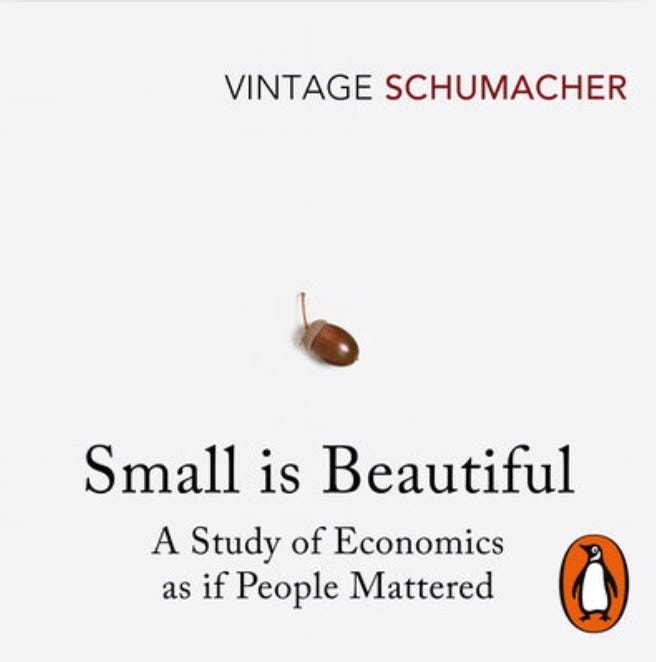
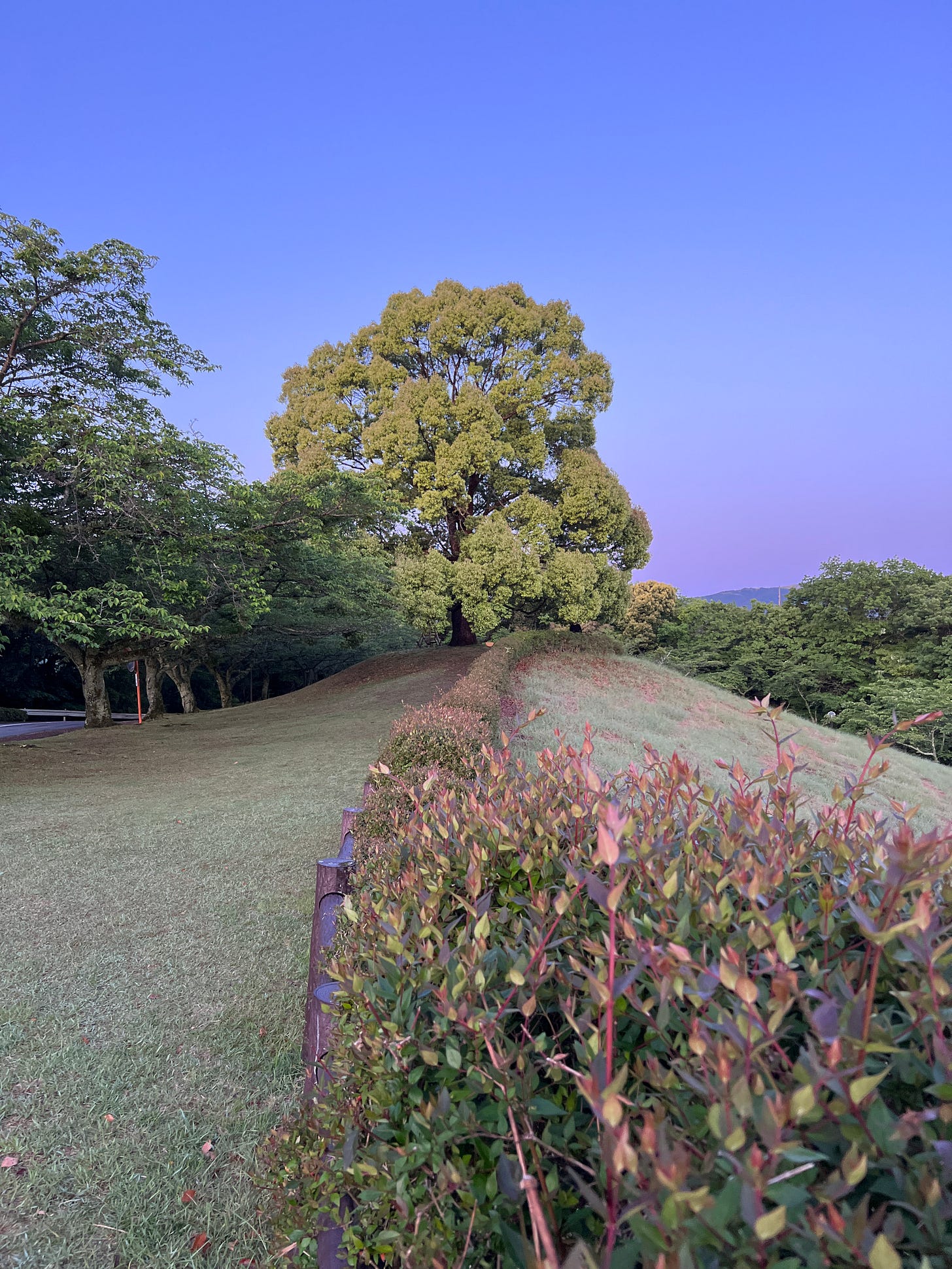
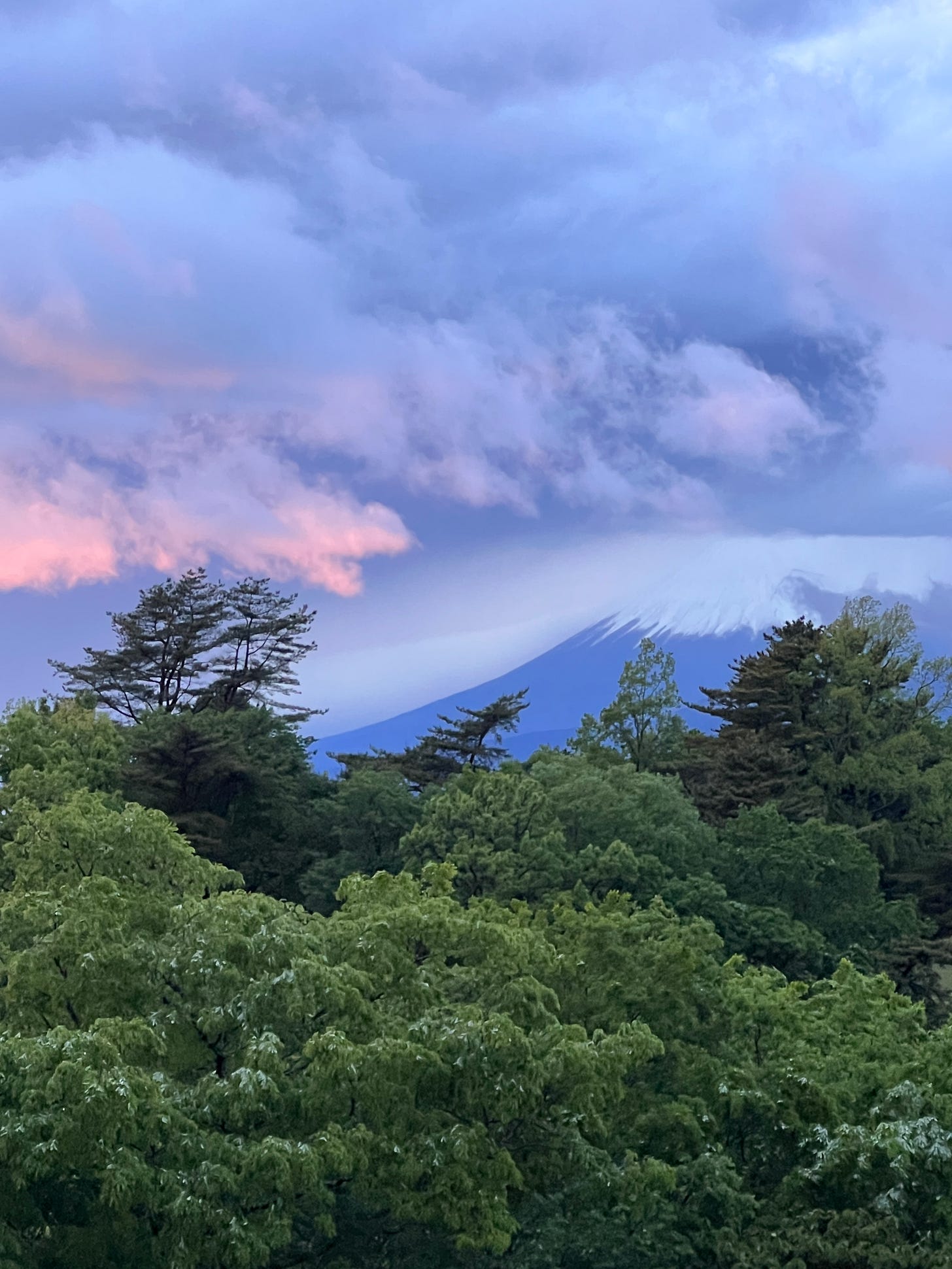
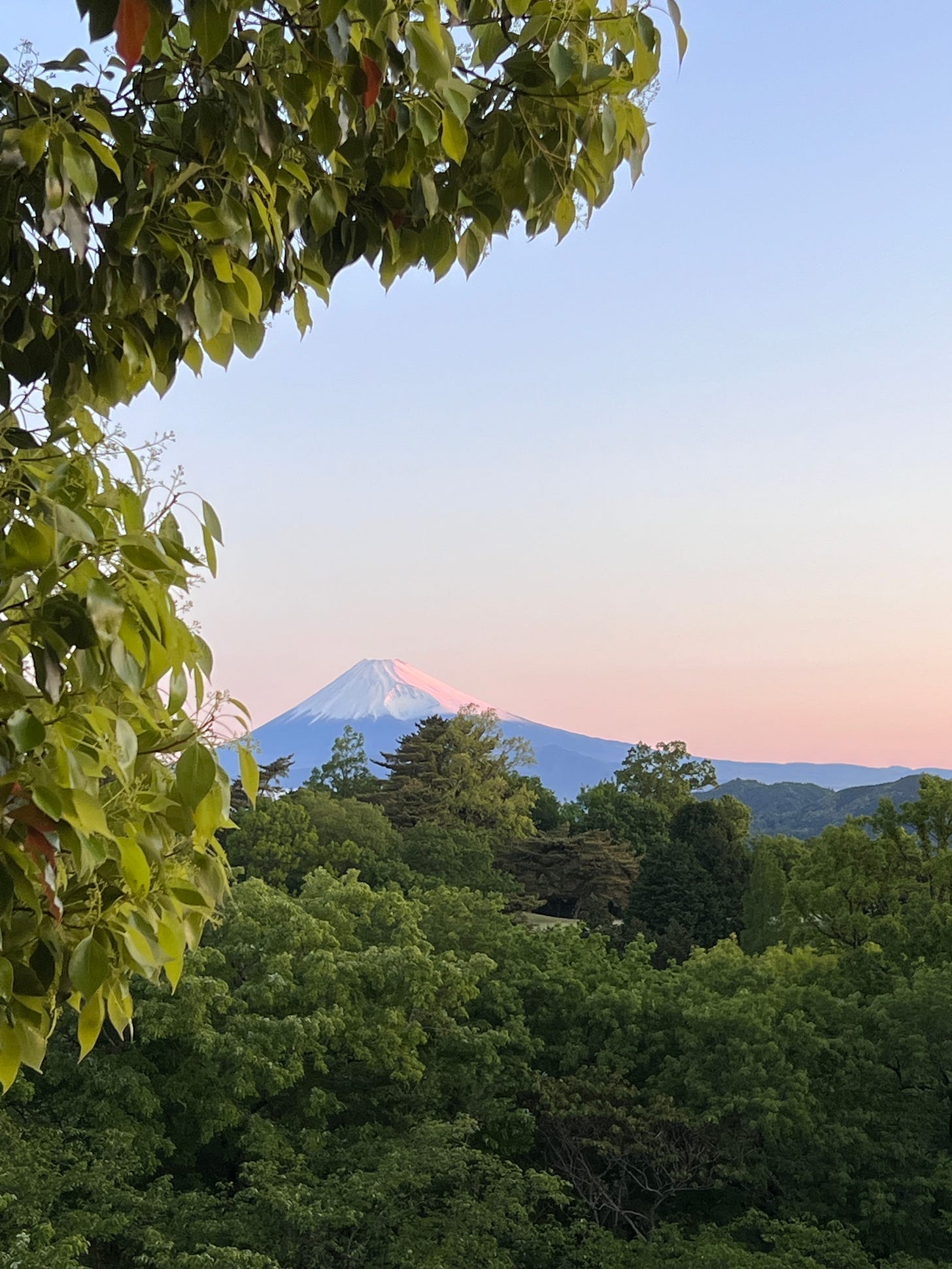

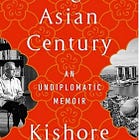
I love 'Small is Beautiful' and E. F. Schumacher's philosophy. Thank you.
Thanks for this summary. Sadly I think we have a long way to go.